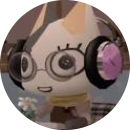Các câu hỏi tương tự
Exercise 13: Mark the letter A, B, C, or D to indicate the sentence that is closest in meaning to the original sentence in each of the following questions. 111.The garden is behind Linh’s house.A. Linh’s house is in front of the garden.B. Linh’s house is next to the garden.C. Linh’s house is under the garden.D. Linh’s house is on the garden. 112.My school has 25 classroomsA. There are 25 classrooms in my school.B. There is 25 classrooms in my school.C. There have 25 classrooms in my school.D. Th...
Đọc tiếp
Exercise 13: Mark the letter A, B, C, or D to indicate the sentence that is closest in meaning to the original sentence in each of the following questions.
111. | The garden is behind Linh’s house.
| ||||
112. | My school has 25 classrooms
| ||||
113. | There are many flowers in our garden.
| ||||
114. | This dress is long.
| ||||
115. | Mina likes history most.
| ||||
116. | That car is red.
| ||||
117. | My house is near the department store.
| ||||
118. | He has an oval face.
| ||||
119. | Nam has a cousin, Vy.
| ||||
120. | Her mother has long hair.
|
A. Fill in the gap with the correct names.1. ______________ is going to a street party in Scotland.2. ______________ is going to sing on New Year’s Eve.3. ______________ will be in a foreign country on New Year’s Eve.4. ______________ isn’t going to make any New Year’s resolutions.5. ______________ wants to learn to play a musical instrument.6. ______________ wants to have a healthier diet.B. Decide if the statements are true (T) or false (F).1. New Year’s resolutions often involve...
Đọc tiếp
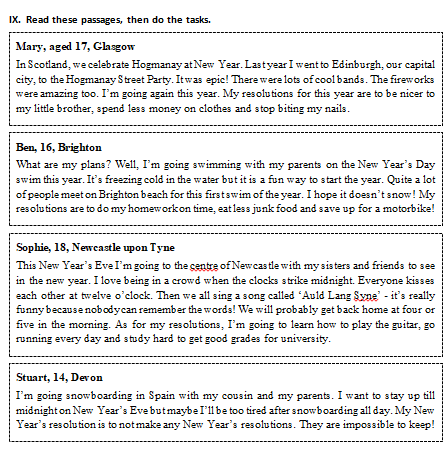
A. Fill in the gap with the correct names.
1. ______________ is going to a street party in Scotland.
2. ______________ is going to sing on New Year’s Eve.
3. ______________ will be in a foreign country on New Year’s Eve.
4. ______________ isn’t going to make any New Year’s resolutions.
5. ______________ wants to learn to play a musical instrument.
6. ______________ wants to have a healthier diet.
B. Decide if the statements are true (T) or false (F).
1. New Year’s resolutions often involve health and money.
2. People usually celebrate Hogmanay at New Year in England.
3. There are no fireworks for Hogmanay.
4. It’s traditional to go swimming in Brighton on New Year’s Eve.
5. People sing a song called ‘Auld Lang Syne’ at midnight on New Year’s Eve.
6. Most British people know all the words to ‘Auld Lang Syne’.
A. Fill in the gap with the correct names.1. ______________ is going to a street party in Scotland.2. ______________ is going to sing on New Year’s Eve.3. ______________ will be in a foreign country on New Year’s Eve.4. ______________ isn’t going to make any New Year’s resolutions.5. ______________ wants to learn to play a musical instrument.6. ______________ wants to have a healthier diet.B. Decide if the statements are true (T) or false (F).1. New Year’s resolutions often involve...
Đọc tiếp
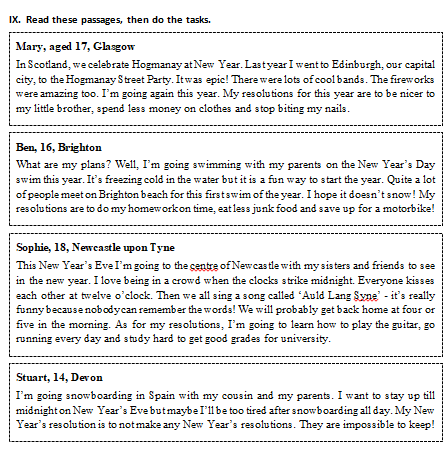
A. Fill in the gap with the correct names.
1. ______________ is going to a street party in Scotland.
2. ______________ is going to sing on New Year’s Eve.
3. ______________ will be in a foreign country on New Year’s Eve.
4. ______________ isn’t going to make any New Year’s resolutions.
5. ______________ wants to learn to play a musical instrument.
6. ______________ wants to have a healthier diet.
B. Decide if the statements are true (T) or false (F).
1. New Year’s resolutions often involve health and money.
2. People usually celebrate Hogmanay at New Year in England.
3. There are no fireworks for Hogmanay.
4. It’s traditional to go swimming in Brighton on New Year’s Eve.
5. People sing a song called ‘Auld Lang Syne’ at midnight on New Year’s Eve.
6. Most British people know all the words to ‘Auld Lang Syne’.
A. Fill in the gap with the correct names.1. ______________ is going to a street party in Scotland.2. ______________ is going to sing on New Year’s Eve.3. ______________ will be in a foreign country on New Year’s Eve.4. ______________ isn’t going to make any New Year’s resolutions.5. ______________ wants to learn to play a musical instrument.6. ______________ wants to have a healthier diet.B. Decide if the statements are true (T) or false (F).1. New Year’s resolutions often involve...
Đọc tiếp
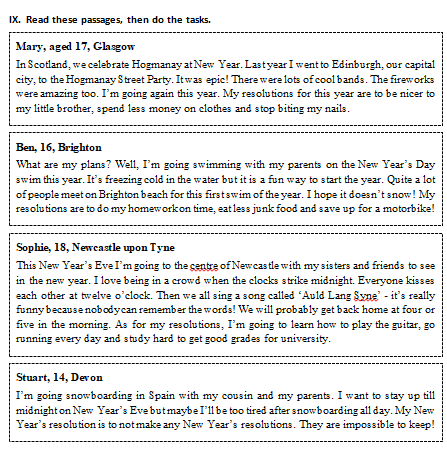
A. Fill in the gap with the correct names.
1. ______________ is going to a street party in Scotland.
2. ______________ is going to sing on New Year’s Eve.
3. ______________ will be in a foreign country on New Year’s Eve.
4. ______________ isn’t going to make any New Year’s resolutions.
5. ______________ wants to learn to play a musical instrument.
6. ______________ wants to have a healthier diet.
B. Decide if the statements are true (T) or false (F).
1. New Year’s resolutions often involve health and money.
2. People usually celebrate Hogmanay at New Year in England.
3. There are no fireworks for Hogmanay.
4. It’s traditional to go swimming in Brighton on New Year’s Eve.
5. People sing a song called ‘Auld Lang Syne’ at midnight on New Year’s Eve.
6. Most British people know all the words to ‘Auld Lang Syne’
A. Fill in the gap with the correct names.1. ______________ is going to a street party in Scotland.2. ______________ is going to sing on New Year’s Eve.3. ______________ will be in a foreign country on New Year’s Eve.4. ______________ isn’t going to make any New Year’s resolutions.5. ______________ wants to learn to play a musical instrument.6. ______________ wants to have a healthier diet.B. Decide if the statements are true (T) or false (F).1. New Year’s resolutions often involve...
Đọc tiếp
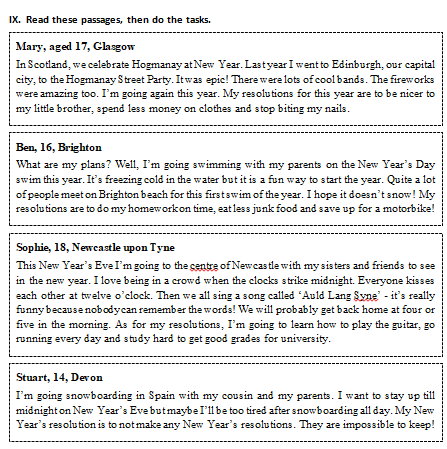
A. Fill in the gap with the correct names.
1. ______________ is going to a street party in Scotland.
2. ______________ is going to sing on New Year’s Eve.
3. ______________ will be in a foreign country on New Year’s Eve.
4. ______________ isn’t going to make any New Year’s resolutions.
5. ______________ wants to learn to play a musical instrument.
6. ______________ wants to have a healthier diet.
B. Decide if the statements are true (T) or false (F).
1. New Year’s resolutions often involve health and money.
2. People usually celebrate Hogmanay at New Year in England.
3. There are no fireworks for Hogmanay.
4. It’s traditional to go swimming in Brighton on New Year’s Eve.
5. People sing a song called ‘Auld Lang Syne’ at midnight on New Year’s Eve.
6. Most British people know all the words to ‘Auld Lang Syne’.
A. Fill in the gap with the correct names.1. ______________ is going to a street party in Scotland.2. ______________ is going to sing on New Year’s Eve.3. ______________ will be in a foreign country on New Year’s Eve.4. ______________ isn’t going to make any New Year’s resolutions.5. ______________ wants to learn to play a musical instrument.6. ______________ wants to have a healthier diet.B. Decide if the statements are true (T) or false (F).1. New Year’s resolutions often involve...
Đọc tiếp
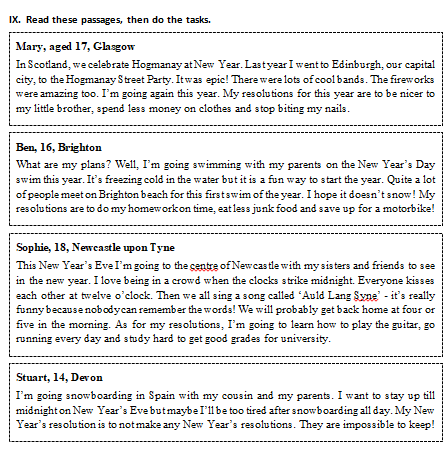
A. Fill in the gap with the correct names.
1. ______________ is going to a street party in Scotland.
2. ______________ is going to sing on New Year’s Eve.
3. ______________ will be in a foreign country on New Year’s Eve.
4. ______________ isn’t going to make any New Year’s resolutions.
5. ______________ wants to learn to play a musical instrument.
6. ______________ wants to have a healthier diet.
B. Decide if the statements are true (T) or false (F).
1. New Year’s resolutions often involve health and money.
2. People usually celebrate Hogmanay at New Year in England.
3. There are no fireworks for Hogmanay.
4. It’s traditional to go swimming in Brighton on New Year’s Eve.
5. People sing a song called ‘Auld Lang Syne’ at midnight on New Year’s Eve.
6. Most British people know all the words to ‘Auld Lang Syne’.
I . Choose the correct option to complete the sentences.0 I live in a country called Asia / New Zealand.1 I’d really like to learn another country / foreign language.2 I have a really nice phone conversation / message with my grandma every week.3 Can you speak Chinese easily / fluently?4 Did you see Andrea’s post / tweet / text on Facebook yesterday? It was really funny!5 The Pacific Lake / Sea / Ocean covers about half of the planet.6 In the Geography quiz at school...
Đọc tiếp
I . Choose the correct option to complete the sentences.
0 I live in a country called Asia / New Zealand.
1 I’d really like to learn another country / foreign language.
2 I have a really nice phone conversation / message with my grandma every week.
3 Can you speak Chinese easily / fluently?
4 Did you see Andrea’s post / tweet / text on Facebook yesterday? It was really funny!
5 The Pacific Lake / Sea / Ocean covers about half of the planet.
6 In the Geography quiz at school today, the teacher demanded / gave / asked / made questions about different countries.
7 If you look at a map and see an arrow pointing down towards Antarctica, it’s pointing north / south / east / west.
Question IX. Rearrange the words given into the meaning sentences 1. yard/ front/ school/There/ big/ of/ is/ our/ in/ a.......................................................................................................................................................2. many/ right/ the/ museum/ Are/ flowers/ the/ there/ to/ of/?......................................................................................................................................................3. next/ photocop...
Đọc tiếp
Question IX. Rearrange the words given into the meaning sentences
1. yard/ front/ school/There/ big/ of/ is/ our/ in/ a.
......................................................................................................................................................
2. many/ right/ the/ museum/ Are/ flowers/ the/ there/ to/ of/?
......................................................................................................................................................
3. next/ photocopy/ What/ store/ there/ the/ is/ to /?
......................................................................................................................................................
4. hospital/ father/ in/ the/ city/ My/ a/ works/ in.
......................................................................................................................................................
5. there/ family/ many/ in/ are/ How/ Linh’s/ people/ ?
……………………………………………………………………………………………………
The schools in the country are bigger then the ones in the country
= the schools in the country........................................................








